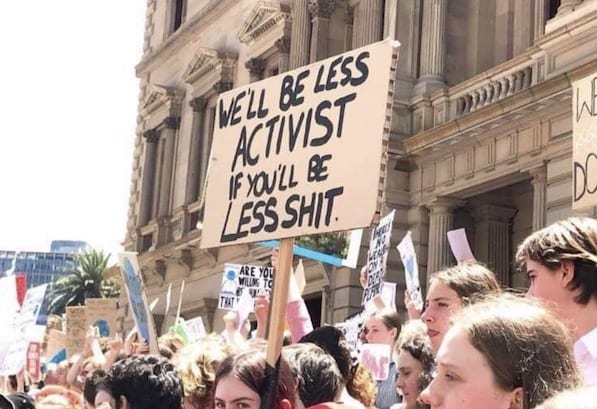They’re part of a coordinated strike occurring in 105 countries all over the world.
And they’re being considerably more vocal than our own Environment Minister Melissa Price, who has been pretty much MIA on the issue since she was appointed to the role last year.
Thousands of students will join the strike in Australia, despite NSW education minister Rob Stokes’ demand that they “turn up to school.”
“Don’t rob yourself of the opportunities to get a great quality education,” he told 2GB’s Steve Price. “As adults, we have a shared responsibility to encourage our young people to attend school.”
Defence Minister Christopher Pyne’s also had his say, telling the Today show this morning that kids should be “gaining knowledge” by staying in school, and that strikes and “political activism” should occur outside of school hours.
“So I’m not quite sure why they think that it is a good idea. Obviously the government is acting on climate change. Climate change is inevitable,” he said. Simple! Nothing to see here.
Prior to the November student strike last year, Prime Minister Scott Morrison also ordered students to “stay in school”.
Interestingly, some conservatives in the United Kingdom are actually throwing their support behind those joining the strike, including Tories who have backed this video campaign by the Conservative Environmental Network.
A message for school climate strikers. 🔊🔊🔊 #TogetherWeCanStopClimateChange #SchoolStrike4Climate #ClimateStrike #FridaysforFuture #ClimateAction pic.twitter.com/wN1pcQ8J7l
— CEN (@CEN_HQ) March 14, 2019
This comment from Rebecca Pow for example, a British Conservative Party politician, comes in stark contrast to what we hear from Australian conservatives: “We get that it can feel like a challenge to get real change in Parliament. But your passion is an inspiration to us.” (Sure, the video also goes on to promote their government’s climate record, but they’re actually telling students to stay vocal on climate change).
Meanwhile, founder of the Strike for Climate movement Greta Thunberg has been nominated for a Nobel Peace Prize by Norway, with MP Freddy André Øvstegård stating that: “We have proposed Greta Thunberg because if we do nothing to halt climate change it will be the cause of wars, conflict and refugees,” and that “she has launched a mass movement which I see as a major contribution to peace.”
And as this piece from Karena Menzie-Ballantyne that we’ve shared on Women’s Agenda today states, the students protesting show just the kind of traits their future employers may be looking for.
Earlier this week, we spoke to Alexia Giannesini, a school student who has formed part of the committee of climate strikers organising the Sydney version of the protest today. She spoke about organising the strike as being a complex project, about networking with students from other schools to plan the event, and her involvement as part of a leadership group.
Not exactly skills that you learn on an average day at school.
“I don’t know of any climate striker that genuinely wants to miss school. I wish we could live in a country where I could go to school every day with the reassurance that my government was taking care of me and my future,” Alexia told us. “But the reality is far different.”
Late last year we also met fourteen year old Alicia Guiney, who had joined the November strike and carried a sign that read ‘We’ll be less Activist if you’ll be less Shit’, in response to Prime Minister Scott Morrison’s call for more learning and less activism in schools.
“I wrote the slogan as a simple way to remind the PM that we don’t all share his views. And to make the point that we shouldn’t need to do this,” she said at the time.
“I think it’s disappointing that our government, who were elected and trusted to govern properly, cares more about staying in power than listening to the people and doing something about climate change.
“When school kids rally against you, you’ve really hit rock bottom.”
And that’s when things get particularly terrifying for some politicians.


